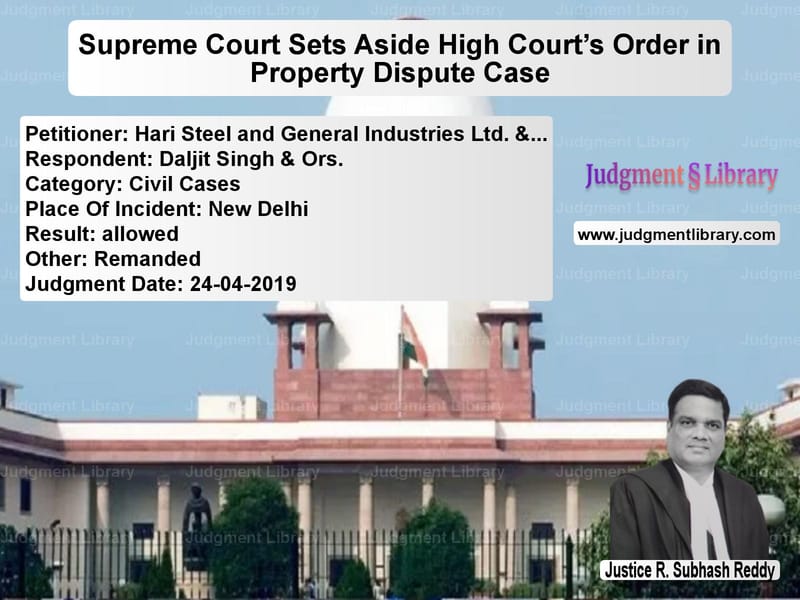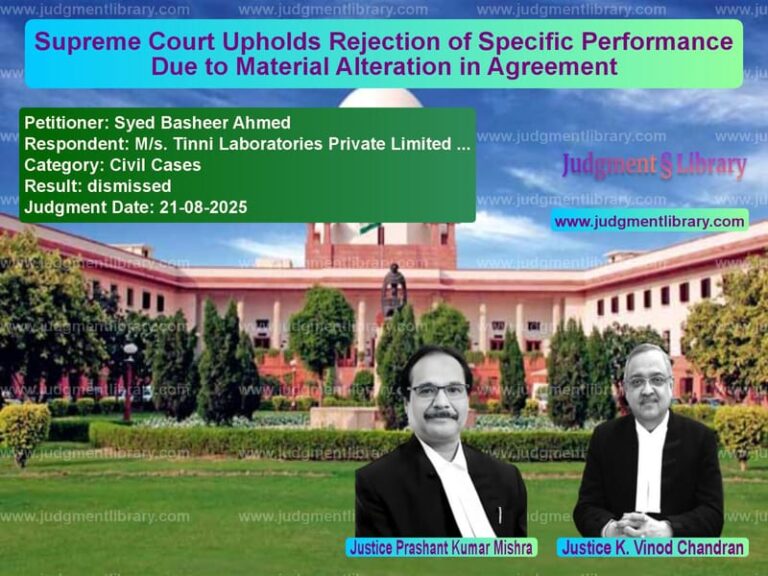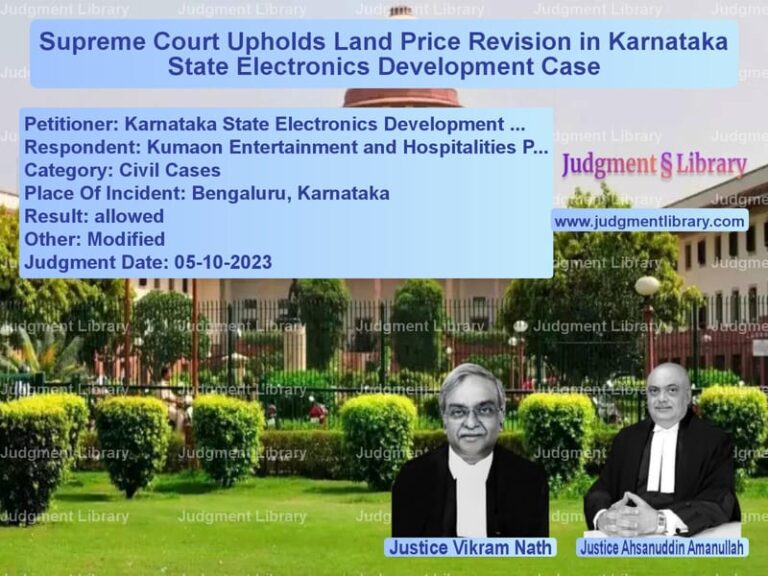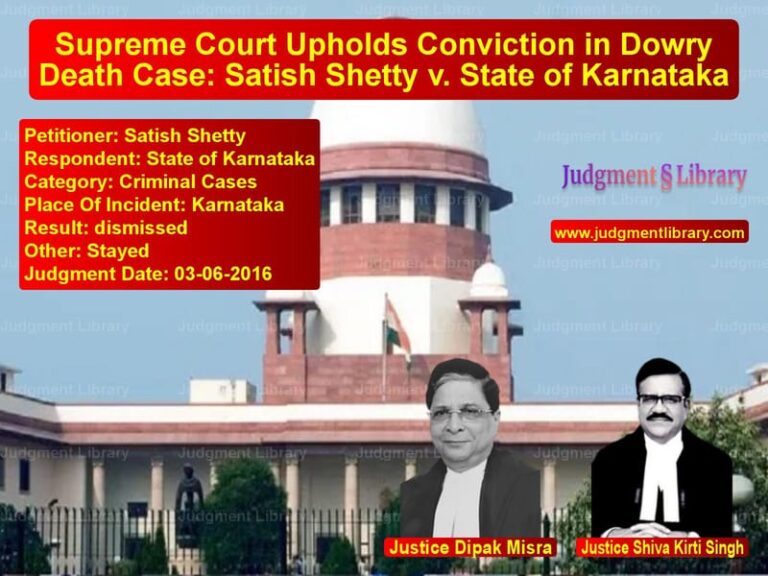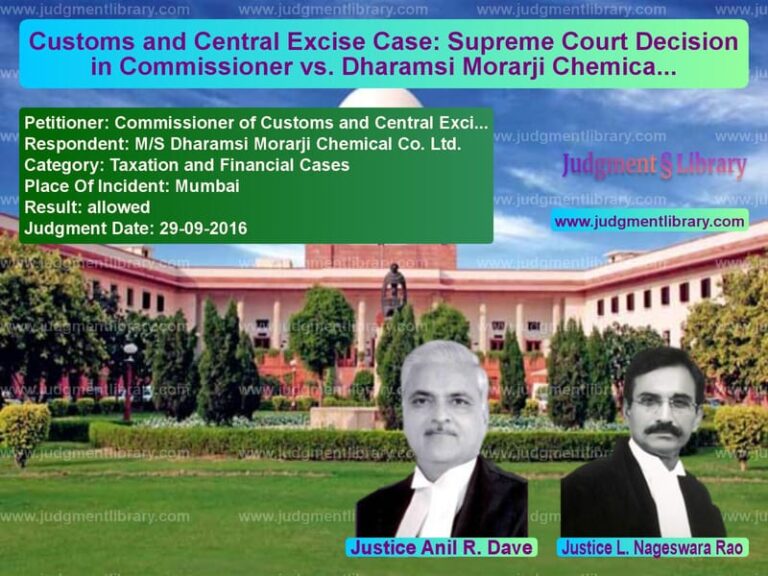Supreme Court Sets Aside High Court’s Order in Property Dispute Case
In an important judgment, the Supreme Court of India set aside a Delhi High Court order that had granted a decree of specific performance in a property dispute without a full-fledged trial. The case, Hari Steel and General Industries Ltd. & Anr. vs. Daljit Singh & Ors., revolved around the sale of an industrial property and a car dealership business, with claims of forgery and disputed payments.
The ruling reaffirms that judgments based on admissions should only be granted when there is a clear, unambiguous, and unconditional acceptance of liability.
Background of the Case
The case originated from a property transaction involving a commercial estate at A-22, Mohan Co-operative Industrial Estate, Mathura Road, New Delhi. The respondents (plaintiffs) filed a suit for specific performance of an agreement to sell, claiming that they had agreed to purchase the property and business for ₹55.50 crores. However, the appellants (defendants) disputed the validity of the agreement, alleging forgery and fraud.
Key developments in the case:
- April 7, 2005: An initial understanding for the sale of the property and business was reached.
- May 3, 2005: A written agreement was signed, but its authenticity was later disputed.
- 2006: The plaintiffs filed a suit seeking specific performance of the agreement.
- 2007: The plaintiffs sought a decree on the basis of admissions made by the defendants under Order XII Rule 6 of CPC.
- 2017: A Single Judge of the Delhi High Court dismissed the application for judgment on admissions, stating that a trial was necessary.
- 2018: The Division Bench of the High Court reversed this decision, granting a decree of specific performance.
- 2019: The Supreme Court set aside the High Court’s order, restoring the trial court’s decision.
Arguments by the Appellants (Hari Steel and General Industries Ltd. & Anr.)
The appellants opposed the High Court’s decision, arguing:
- They never admitted to the agreement being binding, as there were allegations of forgery and tampering.
- They only acknowledged the initial discussions but denied any legally enforceable contract.
- The agreement was incomplete and contained unsigned portions.
- The plaintiffs had fraudulently altered pages in the agreement.
- The High Court wrongly relied on company balance sheets and audit reports as admissions.
Arguments by the Respondents (Daljit Singh & Ors.)
The plaintiffs contended:
- The appellants had admitted the existence of the agreement in earlier statements and financial records.
- The agreement was executed, and the appellants had received an advance payment of ₹5 crores.
- Their readiness and willingness to complete the contract were evident from their financial transactions.
- The High Court correctly applied Order XII Rule 6 of CPC to grant specific performance.
Supreme Court’s Observations and Ruling
The Supreme Court held that the High Court had erred in granting specific performance without a proper trial.
1. No Clear and Unconditional Admission:
The Court emphasized that admissions must be unequivocal:
“A judgment on admission is a judgment without trial which permanently denies any remedy to the defendant. Therefore, unless the admission is clear, unambiguous, and unconditional, the discretion of the Court should not be exercised.”
The Court found that the appellants had contested the agreement’s validity, alleging fabrication and unauthorized modifications.
2. Trial Necessary to Resolve Disputed Facts:
The Court observed that material facts were in dispute:
“When allegations of fraud and forgery are raised, a trial is necessary to examine evidence and determine the truth.”
Since the appellants had contested crucial elements of the agreement, including the authenticity of signatures and payments, a full-fledged trial was required.
3. Balance Sheets and Audit Reports Do Not Constitute Admissions:
The Court ruled that company filings should not be treated as admissions:
“Financial records may indicate business transactions but do not necessarily confirm legal liability under a disputed contract.”
Final Ruling
The Supreme Court allowed the appeal and restored the trial court’s order:
- The suit for specific performance was reinstated for trial.
- The High Court’s decree of specific performance was set aside.
- The trial court was directed to expedite the proceedings.
- The plaintiffs were permitted to seek refund of the deposited amount.
Implications of the Judgment
This ruling has significant implications for contract enforcement and civil litigation:
- Reaffirming fair trial principles: Courts must not grant summary judgments when factual disputes exist.
- Admissions must be clear: Defendants should not be deprived of their right to contest a claim unless there is an unequivocal admission.
- Corporate records do not automatically establish liability: Business filings cannot substitute for direct evidence in contractual disputes.
- Safeguards against misuse of Order XII Rule 6 CPC: This judgment prevents misuse of procedural shortcuts to obtain unjust enrichment.
The Supreme Court’s ruling in Hari Steel and General Industries Ltd. & Anr. vs. Daljit Singh & Ors. ensures that complex property and business disputes are resolved through proper judicial scrutiny rather than summary proceedings.
Petitioner Name: Hari Steel and General Industries Ltd. & Anr..Respondent Name: Daljit Singh & Ors..Judgment By: Justice R. Subhash Reddy.Place Of Incident: New Delhi.Judgment Date: 24-04-2019.
Don’t miss out on the full details! Download the complete judgment in PDF format below and gain valuable insights instantly!
Download Judgment: Hari Steel and Gener vs Daljit Singh & Ors. Supreme Court of India Judgment Dated 24-04-2019.pdf
Direct Downlaod Judgment: Direct downlaod this Judgment
See all petitions in Contract Disputes
See all petitions in Property Disputes
See all petitions in Judgment by R. Subhash Reddy
See all petitions in allowed
See all petitions in Remanded
See all petitions in supreme court of India judgments April 2019
See all petitions in 2019 judgments
See all posts in Civil Cases Category
See all allowed petitions in Civil Cases Category
See all Dismissed petitions in Civil Cases Category
See all partially allowed petitions in Civil Cases Category

